‘My heifer’s just won at the Macksville Show’: Life with Phillip Hughes, and his eternal Redbacks legacy
They were housemates, teammates, a couple of boys from NSW making ends meet in South Australia. Tom Cooper opens up on his friendship with Phillip Hughes, as Darren Berry reveals what brought him to SA.
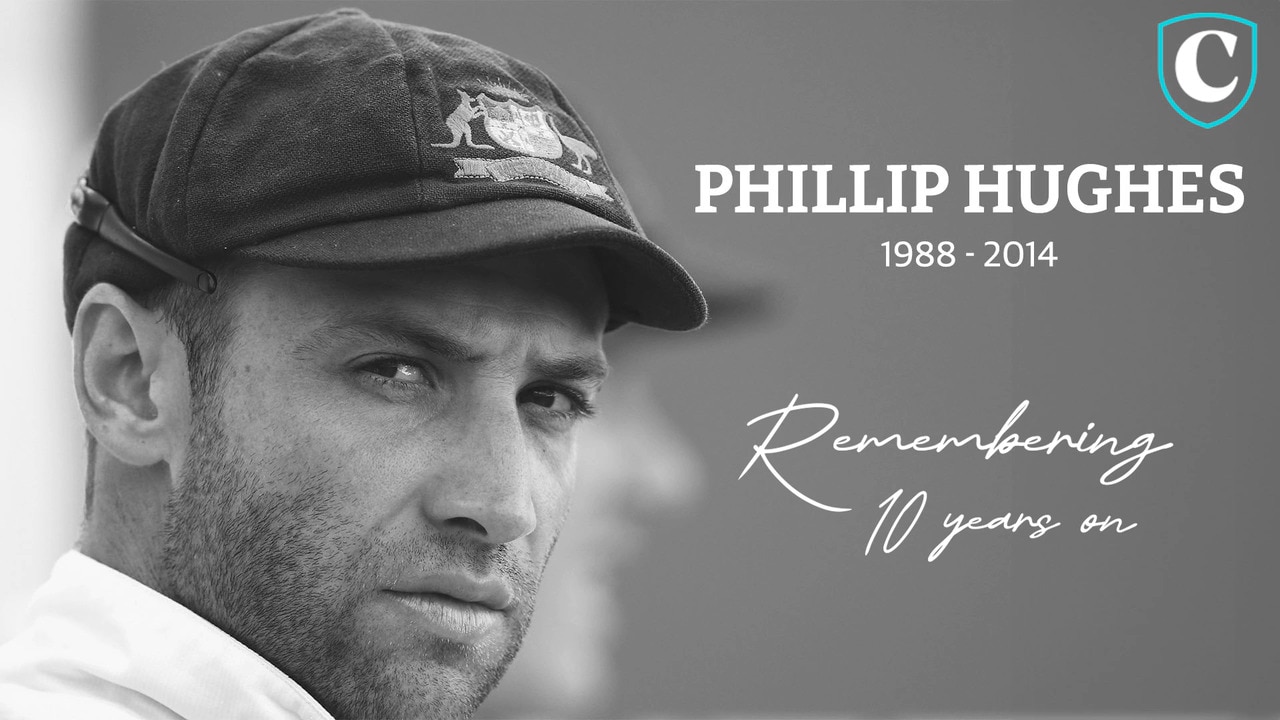
Steve Smith or Phillip Hughes? That was the choice for South Australia as the longtime domestic whipping boys sought to find a rising star to complement the Redbacks’ existing squad 12 years ago.
“Not many people know this. At the time we had a choice between Steve Smith and Phillip Hughes as to who we were going to target. We met Steve Smith’s manager (Warren Craig), we never met Steve, but (SACA cricket chief) Jamie (Cox) and I flew to Sydney,” former SA coach Darren Berry revealed ahead of the 10-year anniversary of Hughes’ tragic death.
“We wanted to find someone that had really good character that could add to the South Australian group and help the group of batsmen in Callum Ferguson, Tom Cooper and more importantly an emerging Travis Head.
“I still remember, it was a hotel right near the Sydney airport, and we probably had 45 minutes Jamie and myself and Phillip, talking about the potential of him moving to South Australia. When I left that room I said to Jamie, I don’t care what we do, we have to get this boy.
“Phillip Hughes or Steve Smith, and we went with Phillip Hughes, and I’m glad we did. I have not told anyone that before.”
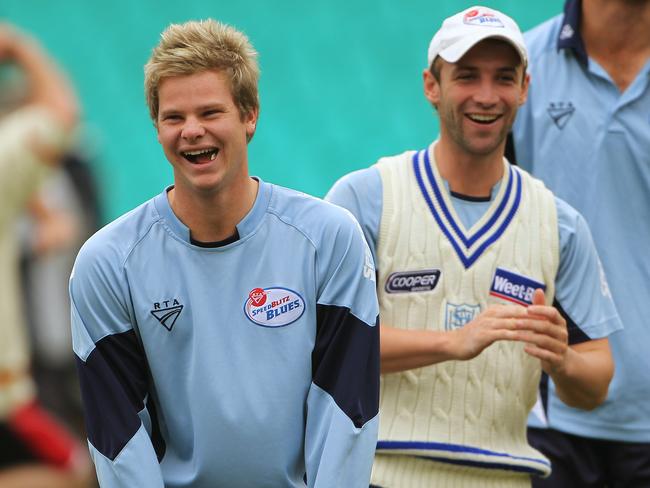
TWO BOYS FROM THE NORTH COAST
That the country boy from Macksville NSW would find his way to Adelaide, and end up living with another NSW country boy Tom Cooper and share his final, unbroken batting partnership with that roommate is a story in itself and their enduring friendship helps explain why Hughes was such a beloved character in Australian cricket.
Cooper had moved to SA before Hughes exploded onto the Test scene in South Africa in early 2009. A few years later, they crossed paths while playing a Pro40 game at The Hague in 2012, with Cooper’s Dutch outfit up against Worcestershire, where Hughes was having a county stint.
With the Netherlands bowled out for 57, the match was over quickly. Cooper remembers Hughes telling him that he’d been talking to Berry about a shift to SA.
Soon realising Hughes was seriously considering the venture, Cooper began talking up the merits of Adelaide.
Years earlier, when they had batted together for the first time, Hughes ran out Cooper.
“We were almost both in the middle of the wicket, and he sort of burnt me, as he had a habit of,” Cooper recalls.
A couple of years older and more established in the regional representative pathway than his batting partner, Cooper selflessly took the fall, allowing Hughes to keep going.
RUMOURS OF THE MACKSVILLE MACHINE
Cooper, from Lismore, had heard the chat about the boy from Macksville who made centuries look like shelling peas.
“It was almost like a myth before it even even happened,” Cooper said.
“Obviously, the rumours were about all these runs he was scoring, but at that stage, like he wasn’t a big man, when he was an adult, like he was literally knee high to a grasshopper at that stage, and could only score runs behind the wicket. His cut shot, that’s why he sort of was so good at it I guess. They clearly couldn’t get him out, and he scored runs, but it wasn’t like he dominated, he didn’t smack attacks but he just he scored runs.”
So ahead of the curve was Hughes, Cooper recalls it was controversial when he was left out of an under-19 side in large part because he would have three more years of eligibility and older players were to be preferred while they still fit the age bill.
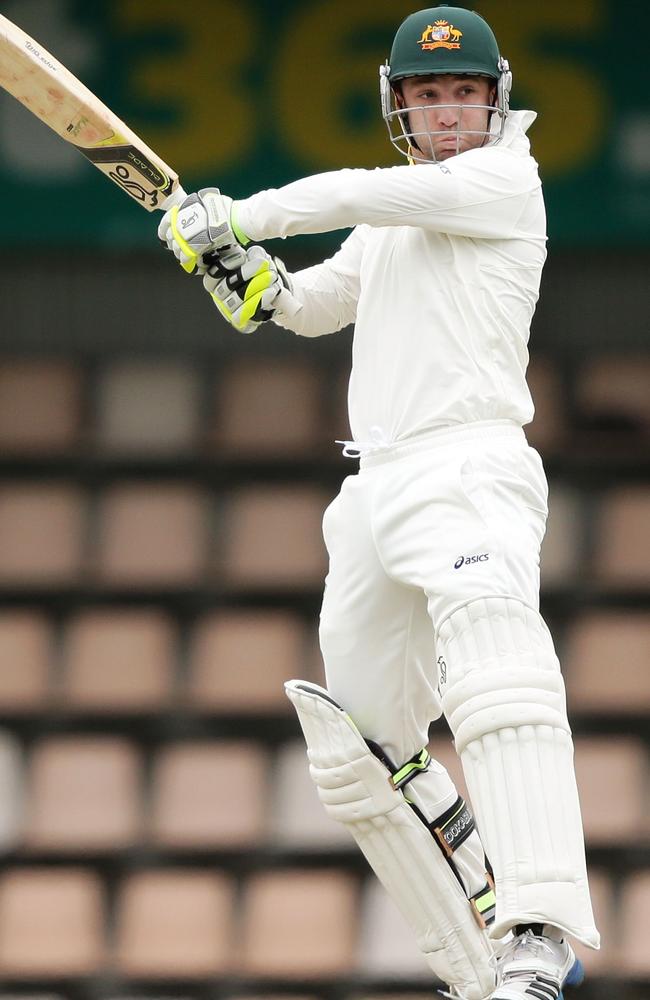
LIVING WITH HUGHES
When he joined SA, Hughes didn’t move in with Cooper straight away, instead staying at an apartment organised by the SACA.
“There was nothing in the fridge apart from like a bottle of water, no food in the cupboards, ironing board was set up in the kitchen,” Cooper said.
“So basically, he used the kitchen to iron his stuff because he always had to look a million dollars. I obviously spent a fair bit of time around there, ‘it was almost like, how is this guy surviving?’ He just used to eat out every meal, and then like he’d almost get annoyed when I’d be ‘man, I can’t afford to keep eating out every meal with you. And also I enjoy cooking my own food.’”
The following season, the pair found new digs in the inner northern suburb of Ridleyton where paceman Allan Wise had built a house before moving back to Victoria.
Cooper had to convince Hughes not to eat out nightly, but the younger man still had some curious lifestyle habits.
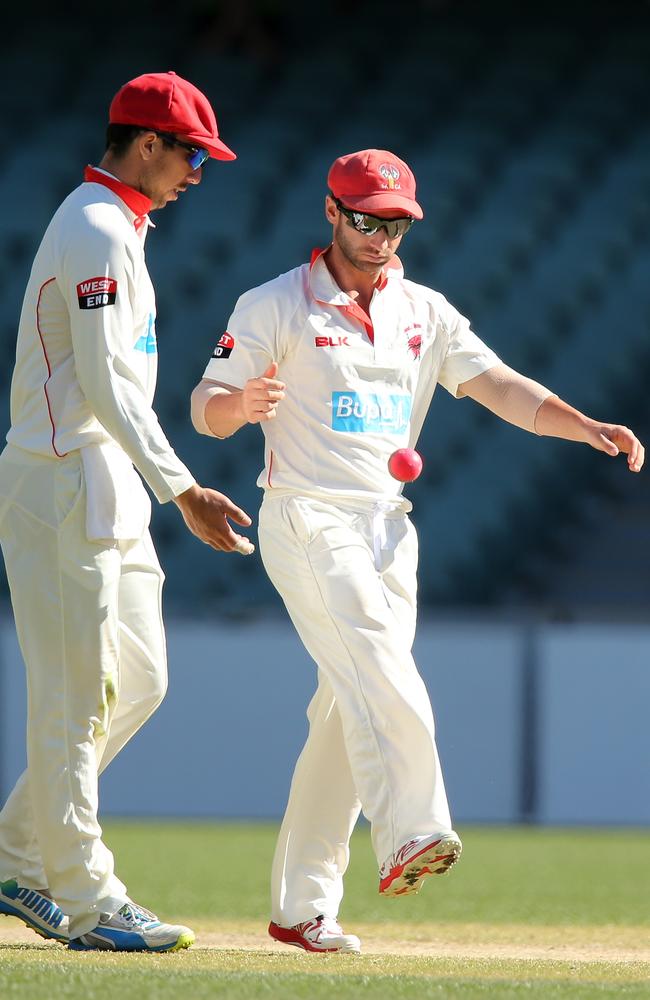
“He literally paid a year’s rent up front, random things like that. We walked into the bank at Norwood. ‘Can I get 10 grand out please?’ And the look on the lady’s face, she’s like, ‘usually you need to give us notice for this.’ He was like, ‘no I don’t, I do it all the time. It’s my money, can I have it?’ Then he just like hands it to me in the bank, it would have looked so dodgy. Because he probably hadn’t paid for six months, so he was like ‘here’s what I owe you plus up until here’ or whatever, and then basically, I would become his bank.”
Having chosen to live with Cooper, Hughes was always desperate to room with him on away trips too. One night after Hughes had posted a ton at the MCG, they got back to their hotel room where Hughes got straight onto the phone to speak to his father. All of a sudden came a directive from across the room.
“Coops, get your clothes on, we’re going out,” Hughes said. Cooper was nonplussed given centuries were a routine occurrence for Hughes and hardly cause for a massive night on the town. “My heifer’s just won at the Macksville Show!”
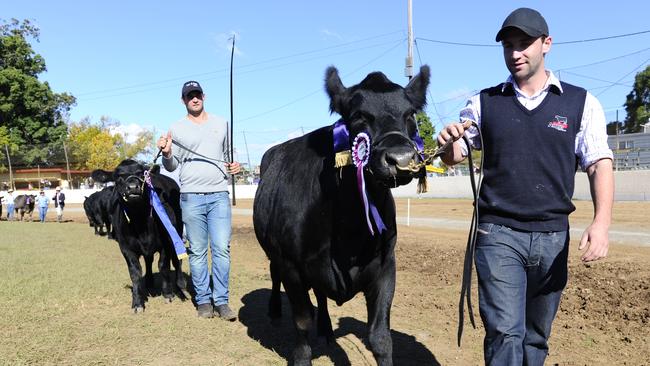
“So we were out because one of his cows had just won first prize, not because he’d just peeled off a hundred,” Cooper said.
“He had the bling and loved the bright lights. But he talked with his mum and dad daily. Everything was about his cows. We had a plan about how I would work for him afterwards, because he obviously was earning a shitload of money at the time and had the farm set up.
“He talked about that more than he talked about cricket. And then we used to almost like bitch to each other about selection or problem, we would vent to each other, and then that’d be it. You wouldn’t hear it again.
“If his cow didn’t win he’d be shattered. But with cricket, and obviously he was very mentally strong, but it was just a game.”
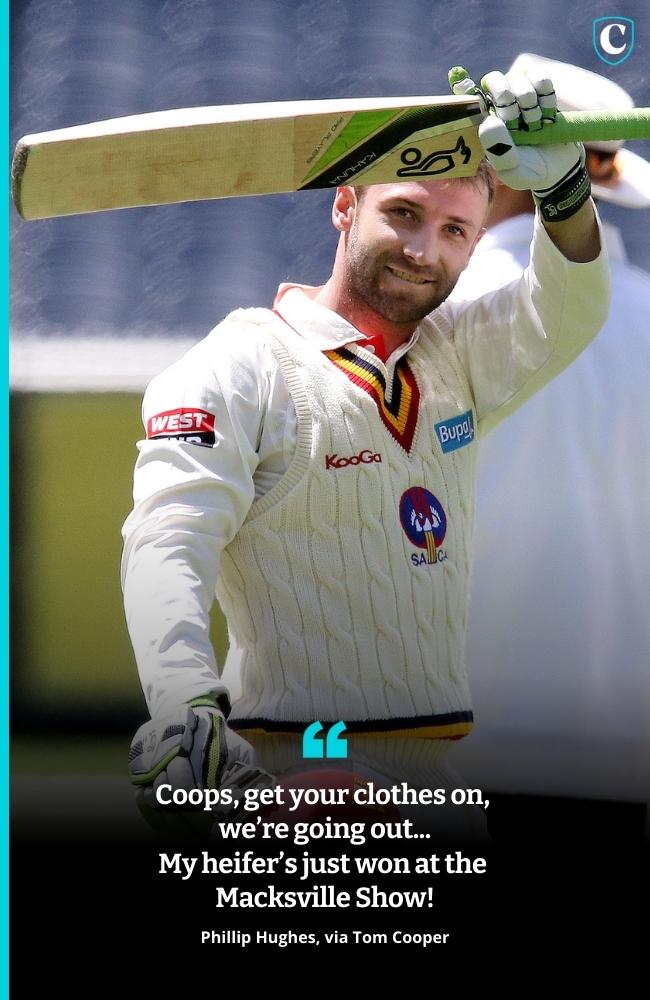
RETURNING TO CRICKET
As though the horror of what befell Hughes a decade ago needed to be any closer to home for Cooper, there was the added element too that he had been hit in a near-identical spot to Hughes in a Shield match in early 2009 by Victorian firebrand Shane Harwood.
“For six months I had woke up like I was hung over every day, wasn’t allowed to run, wasn’t allowed to do any sport, wasn’t allowed to watch TV. But then six months later, like I was fine as such, I was back playing that next season, so whilst it rattled me, then everyone’s telling me how they’re gonna hit me in the head again, or whatever, but I was fine as such,” Cooper said.
“To see this happen and it was literally within millimetres, and obviously him not be fine that was all quite surreal. And we realised how lucky actually I was.”
After the shock and devastation of Hughes’ death and the funeral the following week, the Redbacks had to front up to another Shield game in Hobart less than a fortnight after the death of their teammate.
“I remember walking out to bat and literally shaking while I was facing up,” Cooper said.
Having nicked one from Andrew Fekete to fall for 20, Cooper remembers returning to the change rooms to be embraced by assistant coach Jeff Vaughan, who was almost in tears.
“It was almost like ‘why the hell are we doing this?’”
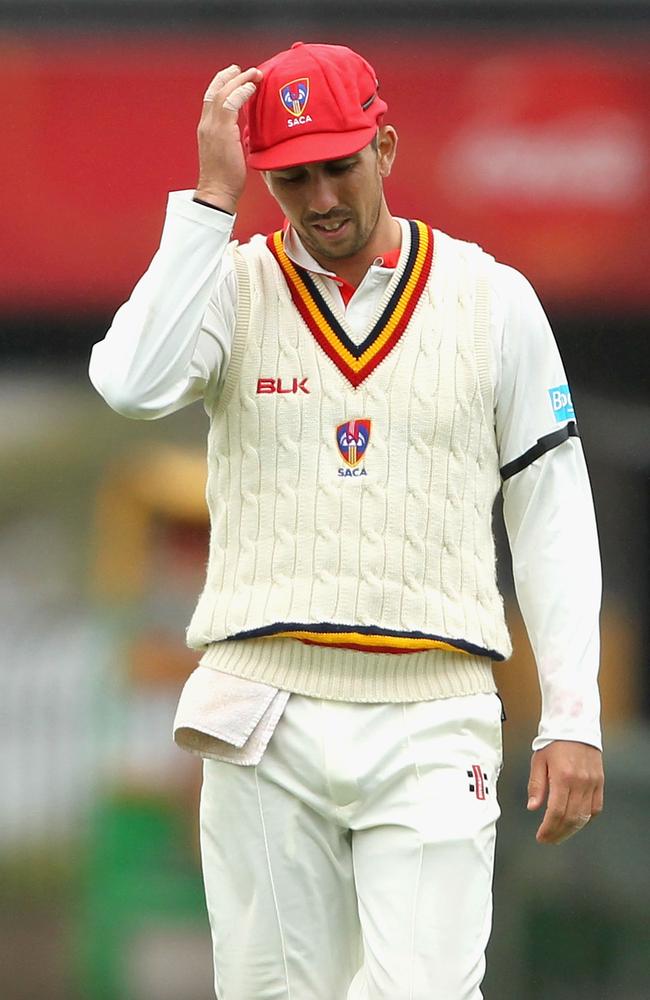
SA players were compelled to see a psychologist. Cooper says that after his session, the shrink told him that he seemed fine. But in retrospect he feels he was masking deep damage within.
He contends his cricket suffered as a result. He had been the second-leading run-scorer in the Shield in 2013-14, averaging 51.82. But after Hughes’ death, Cooper’s form nosedived to the extent that he lost his state contract at the end of the 2015-16 season.
After time with Somerset in 2015, Cooper returned and saw another psychologist who told him that he had post-traumatic stress disorder. He worked on coping mechanisms and ultimately found a form of closure.
“Looking back, it’s no surprise I averaged 25 during that period or whatever it was. In hindsight I f***** my chances of playing higher.
“There were times in games when I was scared. I was facing Mark Footitt on a wet wicket in a one-day game. I gloved one into my face, and then I basically just slogged after that. I didn’t realise how big an impact it had.”
While Berry stressed that his suffering paled into insignificance compared to that of the Hughes family, the former Victorian captain and 1997 Ashes tourist also lays bare the lingering mental health impact of Hughes’ loss.
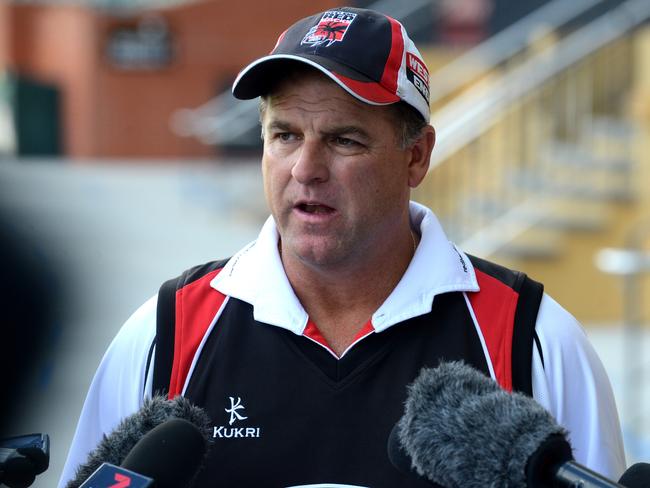
“It just left a haunting scar that I still live with today and I don’t think I’ll ever get over,” Berry said.
“For a significant period I couldn’t sleep and I had nightmares regularly about the incident. I had to see a psychologist to get over it.
“A couple of years after it I was commentating the AFL football with K-Rock Geelong, and I stil remember, I was commentating a game and a player got knocked out. A player got knocked out unconscious and he fell to the ground. I had to take my headphones off and walk out of the commentary box because it was too confronting.
“After that day Tim McGrath, the former Geelong footballer, he’s a good mate of mine and he was commentating with me, and said to me ‘are you OK?’ I looked at him and I started crying.
“He said to me, ‘mate I’ve got someone in Melbourne that you need to see.’
“Like most blokes I said, ‘no I’m not going to see a sports psychologist, mate stick it up your arse.’ He said to me, ‘if you don’t go on Monday, I’ll be at your house and I’ll drive you there, so you’re going.’ I haven’t told anyone this. I was diagnosed with post-traumatic stress disorder. It really f***** me up because I just couldn’t move forward, and I lost a little bit of purpose myself. I’ve learnt some techniques to cope with it, that was only through professional help.”
For Berry, who was at the scene on the night that David Hookes was fatally struck by a bouncer and has also lost close mates Dean Jones, Shane Warne and mentor Dennis Vague in more recent times, Hughes’ death was the one that most shook him.
“Unfortunately for me I’ve lost a lot of very close people to me,” Berry said.
“But that one was the most confronting. I just loved him, I still find it difficult to talk about.”
Berry continues to coach at a junior level and says he regularly uses lessons learnt from Hughes in his work.
“He was an intense trainer but a light-hearted person,” Berry said.
“He was really good for me, because I was an intense trainer. He taught me a lot for a young man. He taught me a lot and helped me be a better coach.
“He said it a lot, ‘hey chill out bruz.’ I was too intense and I had to chill out, and Phillip Hughes taught me that.
“There’s not many days that go past to be honest that I don’t have some kind of memory of him. I refer to him regularly in my current job with young kids coming through and I talk to them about being humble and respectful but to enjoy what you do, and a lot of those things I got from Phillip Hughes.”






To join the conversation, please log in. Don't have an account? Register
Join the conversation, you are commenting as Logout